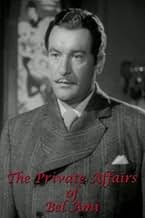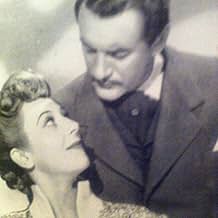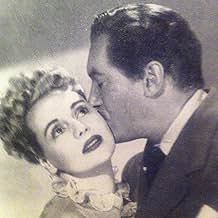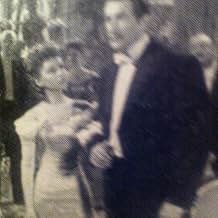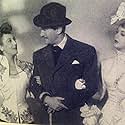IMDb RATING
6.7/10
880
YOUR RATING
In 1880, in Paris, chance brought together two former comrades-in-arms - Charles Forestier, who had become a journalist for "La Vie française" - and Georges Duroy, idle since leaving the six... Read allIn 1880, in Paris, chance brought together two former comrades-in-arms - Charles Forestier, who had become a journalist for "La Vie française" - and Georges Duroy, idle since leaving the sixth regiment of hussars.In 1880, in Paris, chance brought together two former comrades-in-arms - Charles Forestier, who had become a journalist for "La Vie française" - and Georges Duroy, idle since leaving the sixth regiment of hussars.
- Director
- Writers
- Stars
Susan Douglas Rubes
- Suzanne Walter
- (as Susan Douglas)
- Director
- Writers
- All cast & crew
- Production, box office & more at IMDbPro
Featured reviews
"The Private Affairs of Bel Ami" is one of the most unusual films to come out of Hollywood during the Golden Age of Hollywood (1920-1950). An adaptation of a Guy de Maupassant work, "Bel Ami" honestly and bitingly portrays an "homme fatale", a man who uses sex to gain social, economic, and political power. This is the only film, to my knowledge, that portrays such a phenomenon that in real life has been much more common than is commonly held.
George Sanders was never better than as Georges DuRoy. His playing displays the numbing of feelings, desperation of a life of poverty and low social rank, and misogyny that propel him to do what he does. No film character in the Golden Age of Hollywood was as blatantly hateful of women as Georges DuRoy. Witness the scenes with Sanders and Marie Wilson!
The female characters display a moderness in attitudes, relationships with men, and an awareness of their roles in their relationships with Georges DuRoy that is startling not just for 1880, but for 1947, when the film was released. Only French and some Italian films of the 1960's have equalled that frankness by female characters of what their place is in the lives of men.
Ann Dvorak carries much of the film gracefully and with a strong, frank portrayal of a woman much like Georges DuRoy and unapologetic about it. This is definitely Dvorak's finest and the showiest role of her career. Unfortunately, it did not propel her to major stardom and she retired from acting only three years after filming "The Private Affairs of Bel Ami".
Angela Lansbury proved here in this early film of her career what a fine character actress she is. Her portrayal of Clothilde could've been pathetic. Instead, Clothilde emerges as well-rounded character who is never tiresome to watch.
Marie Wilson never got a dramatic part like the one in this film as a Folies Bergere dancer. She only proves the point that behind every great comedienne lies a fine dramatic actress. She truly evokes a character, not the dumb blonde comedy relief that was her stock-in-trade.
A surprising number of top character actors in this film! The film's look and score are very noirish. That only highlights the modernity of the characters in the film, much like 2000's "Moulin Rouge".
The movie looks and plays like an RKO-Radio film noir of the mid-'40's.
Cool concept. The startling use of color for the one scene in which it is used only adds to the uniqueness of this film's acting and look.
The only drawback is the use of decidedly obvious painted backdrops. They only highlight the low budget that was obviously involved in making the film. Too bad, while the rest of the sets appear well-lighted and -appointed.
An arresting film! Definitely worthy of critical and popular reevaluation!
George Sanders was never better than as Georges DuRoy. His playing displays the numbing of feelings, desperation of a life of poverty and low social rank, and misogyny that propel him to do what he does. No film character in the Golden Age of Hollywood was as blatantly hateful of women as Georges DuRoy. Witness the scenes with Sanders and Marie Wilson!
The female characters display a moderness in attitudes, relationships with men, and an awareness of their roles in their relationships with Georges DuRoy that is startling not just for 1880, but for 1947, when the film was released. Only French and some Italian films of the 1960's have equalled that frankness by female characters of what their place is in the lives of men.
Ann Dvorak carries much of the film gracefully and with a strong, frank portrayal of a woman much like Georges DuRoy and unapologetic about it. This is definitely Dvorak's finest and the showiest role of her career. Unfortunately, it did not propel her to major stardom and she retired from acting only three years after filming "The Private Affairs of Bel Ami".
Angela Lansbury proved here in this early film of her career what a fine character actress she is. Her portrayal of Clothilde could've been pathetic. Instead, Clothilde emerges as well-rounded character who is never tiresome to watch.
Marie Wilson never got a dramatic part like the one in this film as a Folies Bergere dancer. She only proves the point that behind every great comedienne lies a fine dramatic actress. She truly evokes a character, not the dumb blonde comedy relief that was her stock-in-trade.
A surprising number of top character actors in this film! The film's look and score are very noirish. That only highlights the modernity of the characters in the film, much like 2000's "Moulin Rouge".
The movie looks and plays like an RKO-Radio film noir of the mid-'40's.
Cool concept. The startling use of color for the one scene in which it is used only adds to the uniqueness of this film's acting and look.
The only drawback is the use of decidedly obvious painted backdrops. They only highlight the low budget that was obviously involved in making the film. Too bad, while the rest of the sets appear well-lighted and -appointed.
An arresting film! Definitely worthy of critical and popular reevaluation!
The movie is is faithful to the novel for about 3/4 of its running time. A handsome, amoral rake cuts his way through the vain, naive, foppish,self centered denizens of Parisian society in the 1880s He is not that smart, but he is shrewd enough to get the money and affection he craves. We don't know where his appetites came from. De Maupassant created him primarily to show the appalling psychological weaknesses of French upper class society "Prety Boy", as he is called, wins and wins big.
Well, the morals code of 1947 would not permit this. A scoundrel thriving is as bad was a naked woman on screen in the 1940s. You couldn't show it! Thus, the entire last section of this movie is made to comply with the code, and it plays out a story of how "Pretty Boy"'s primary victim thwarts his schemes and gets even. She gets even Big.
While I am happy to see the rat get his, this ending undermines the main point of the novel. It also doesn't fit the first three quarters. Characters suddenly behave differently than they did previously with no description of how and why they changed.
Still, it is a literate and intelligent movie. Not many of this kind of movie was made then, and even fewer are made today It is well played. George Sanders is the perfect cad. All the female actors do very well. Even since I first saw Ann Dvorak when I was six or seven, I have had a crush on her all these many decades, so it was good to see her.
Well worth the time for intelligent viewers...and those seniors who love Ann Dvorak!!
Well, the morals code of 1947 would not permit this. A scoundrel thriving is as bad was a naked woman on screen in the 1940s. You couldn't show it! Thus, the entire last section of this movie is made to comply with the code, and it plays out a story of how "Pretty Boy"'s primary victim thwarts his schemes and gets even. She gets even Big.
While I am happy to see the rat get his, this ending undermines the main point of the novel. It also doesn't fit the first three quarters. Characters suddenly behave differently than they did previously with no description of how and why they changed.
Still, it is a literate and intelligent movie. Not many of this kind of movie was made then, and even fewer are made today It is well played. George Sanders is the perfect cad. All the female actors do very well. Even since I first saw Ann Dvorak when I was six or seven, I have had a crush on her all these many decades, so it was good to see her.
Well worth the time for intelligent viewers...and those seniors who love Ann Dvorak!!
In the 1880's, a handsome rake schemes his way to the top of French society leaving a trail of exploited women in his wake.
I was about to slam Sanders' performance as a wooden one-note. Note how in the many close-ups his expression rarely changes, conveying little or no emotion, regardless the situation. Then it occurred to me. That's exactly right for such a heartless egotist as Duroy. In fact, he feels no emotion. Instead he's a walking calculator in the way he uses people. In place of warmth or animated charm, he seduces women with a strongly masculine presence and complete self-assurance, which Sanders conveys, in spades. Note too, how in the dueling scene, Duroy looks on impassively while his opponent musters strength to shoot him. Now a lack of emotion while staring death in the face is either evidence of an iron will or a simple lack of feeling. Of course, as an actor, Sanders can emote subtly or otherwise when called upon, as his lengthy career shows. So I figure his impassive manner in this movie is intended to define Duroy's character, and is not a deficiency on either the actor's or director's part.
Anyway, the movie itself amounts to a triumph of parlor room refinement. I especially like Lansbury. Her baby-face Clotilde provides enough meaningful emotion to engage the audience in ways that Duroy does not. In fact, the actresses, including a poignant Marie Wilson, are all well cast. Still, pairing the 40-year old Sanders with a girlish Douglas, half his age, amounts to a real stretch. But catch some of those parlor room sets that are doozies. The one with the checkered floor and striped wall had me cleaning my glasses. Overall, it's an oddly affecting morality play, with a style and taste that make even the painted backdrops somehow appropriate. Too bad this was the great Warren William's (Laroche) last movie. In terms of a commanding presence, he and Sanders belong together, as William's pre-Code films abundantly show. Nonetheless, this is one of the few features of the time to make a thoroughly dislikable character the central figure. And that took some guts. No wonder the film was an independent production.
I was about to slam Sanders' performance as a wooden one-note. Note how in the many close-ups his expression rarely changes, conveying little or no emotion, regardless the situation. Then it occurred to me. That's exactly right for such a heartless egotist as Duroy. In fact, he feels no emotion. Instead he's a walking calculator in the way he uses people. In place of warmth or animated charm, he seduces women with a strongly masculine presence and complete self-assurance, which Sanders conveys, in spades. Note too, how in the dueling scene, Duroy looks on impassively while his opponent musters strength to shoot him. Now a lack of emotion while staring death in the face is either evidence of an iron will or a simple lack of feeling. Of course, as an actor, Sanders can emote subtly or otherwise when called upon, as his lengthy career shows. So I figure his impassive manner in this movie is intended to define Duroy's character, and is not a deficiency on either the actor's or director's part.
Anyway, the movie itself amounts to a triumph of parlor room refinement. I especially like Lansbury. Her baby-face Clotilde provides enough meaningful emotion to engage the audience in ways that Duroy does not. In fact, the actresses, including a poignant Marie Wilson, are all well cast. Still, pairing the 40-year old Sanders with a girlish Douglas, half his age, amounts to a real stretch. But catch some of those parlor room sets that are doozies. The one with the checkered floor and striped wall had me cleaning my glasses. Overall, it's an oddly affecting morality play, with a style and taste that make even the painted backdrops somehow appropriate. Too bad this was the great Warren William's (Laroche) last movie. In terms of a commanding presence, he and Sanders belong together, as William's pre-Code films abundantly show. Nonetheless, this is one of the few features of the time to make a thoroughly dislikable character the central figure. And that took some guts. No wonder the film was an independent production.
The Private Affairs of Bel Ami (1947)
The weary diffidence of George Sanders makes this movie what it is, but there is a rather large cast of important characters who hold up their types, too. Only Sanders in the lead role (as the Bel Ami) has full roundness to his character. Look, however, for John Carradine and Elsa Lancaster, both welcome and convincing, though they only appear sporadically. Ann Dvorak takes on the second most important role and she's terrific, cast perfectly and acting with cunning.
The story is a period piece, set in late 19th century France. It centers really around one idea--Sanders, who is portraying a real lady's man, gets several women interested in him (or he in them) with somewhat suspicious goals (like money) under his hat. The first half of the movie has these women at odds with each other and Sanders playing his hand just so. Then he lands one of them and a different kind of ambition takes over his life, with some tricks to become yet wealthier. And the movie shifts. It gets fairly complex, based on a French novel by Guy de Maupassant. It has enormous potential, and yet it never quite gels. You can imagine a "Magnificent Ambersons" kind of construction to make it work, but that would require more length. And Orson Welles.
The writing is naturally amazing at times. The characters, as much as they get developed, are intelligent and say intelligent things.
There are two aspects that plague this version. First is Sanders himself. He's one of my favorite actors of this era, but he has a limited kind of style and he's miscast here, lacking the charm and fast wit you would need to pull off all these machinations, some romantic and some political. Second is the way the story is told, cramming the pieces together, jumping from one moment into the future as if there wasn't time to mention that so and so meanwhile died, or that our main man in fact got married. Sometimes this kind of economy makes for a fast movie, but here it feels too harshly edited.
And then there is the slight falseness to the filming, all done in studios, with hints of the city in the background, beautiful but unconvincing light, and sound that is dubbed or added and is sometimes painfully wrong (Sanders whistling without moving his lips, Carradine playing a complicated accordion piece on an instrument without keys, footsteps on a stone walk that sound like a wooden stage, a singer who...you get the idea). The director, Albert Lewin, had a thriving career writing for silent movies (there is an irony in that, I suppose), then he became a producer in the 1930s before switching to directing just a half dozen films in the 1940s. Only one of these has a reputation--The Picture of Dorian Gray--with this one a kind of runner-up. But whatever its promise, it struggles to take off as either a romantic heart-tugger or a social high drama.
Small tidbit--Uma Thurman and others are filming a remake of this story, and naturally all the womanizing has taken on a sexual quality, from what I can see. That's a strength with the way Lewin shot and edited this early one, because we get the way the leading man is a selfish cad without having to get distracted into the prurient details that would distract, even further, from the larger plot.
The weary diffidence of George Sanders makes this movie what it is, but there is a rather large cast of important characters who hold up their types, too. Only Sanders in the lead role (as the Bel Ami) has full roundness to his character. Look, however, for John Carradine and Elsa Lancaster, both welcome and convincing, though they only appear sporadically. Ann Dvorak takes on the second most important role and she's terrific, cast perfectly and acting with cunning.
The story is a period piece, set in late 19th century France. It centers really around one idea--Sanders, who is portraying a real lady's man, gets several women interested in him (or he in them) with somewhat suspicious goals (like money) under his hat. The first half of the movie has these women at odds with each other and Sanders playing his hand just so. Then he lands one of them and a different kind of ambition takes over his life, with some tricks to become yet wealthier. And the movie shifts. It gets fairly complex, based on a French novel by Guy de Maupassant. It has enormous potential, and yet it never quite gels. You can imagine a "Magnificent Ambersons" kind of construction to make it work, but that would require more length. And Orson Welles.
The writing is naturally amazing at times. The characters, as much as they get developed, are intelligent and say intelligent things.
There are two aspects that plague this version. First is Sanders himself. He's one of my favorite actors of this era, but he has a limited kind of style and he's miscast here, lacking the charm and fast wit you would need to pull off all these machinations, some romantic and some political. Second is the way the story is told, cramming the pieces together, jumping from one moment into the future as if there wasn't time to mention that so and so meanwhile died, or that our main man in fact got married. Sometimes this kind of economy makes for a fast movie, but here it feels too harshly edited.
And then there is the slight falseness to the filming, all done in studios, with hints of the city in the background, beautiful but unconvincing light, and sound that is dubbed or added and is sometimes painfully wrong (Sanders whistling without moving his lips, Carradine playing a complicated accordion piece on an instrument without keys, footsteps on a stone walk that sound like a wooden stage, a singer who...you get the idea). The director, Albert Lewin, had a thriving career writing for silent movies (there is an irony in that, I suppose), then he became a producer in the 1930s before switching to directing just a half dozen films in the 1940s. Only one of these has a reputation--The Picture of Dorian Gray--with this one a kind of runner-up. But whatever its promise, it struggles to take off as either a romantic heart-tugger or a social high drama.
Small tidbit--Uma Thurman and others are filming a remake of this story, and naturally all the womanizing has taken on a sexual quality, from what I can see. That's a strength with the way Lewin shot and edited this early one, because we get the way the leading man is a selfish cad without having to get distracted into the prurient details that would distract, even further, from the larger plot.
Albert Lewin's reputation rests almost entirely on two films, "The Picture of Dorian Gray" and "Pandora and the Flying Dutchman" but his masterpiece must surely be the little known and little seen "The Private Affairs of Bel Ami" from the novel by Guy De Maupassant. It is, of course, a very witty portrait of a cad, beautifully played by George Sanders, but it is also a film of considerable psychological depth and one of the most adult and intelligent American pictures of the forties with not a trace of the camp usually associated with the director.
Rather we get an incisive picture of a period and that rarefied milieu of high Parisian society, beautifully written by Lewin and superbly played by everyone. In particular Angela Lansbury is outstanding as the one woman Sanders might actually have feelings for. It's a great performance that should have made Lansbury a major Hollywood player rather than simply the great character actress she became. Even the usually wooden Warren William excels here. If any film cries out for a restoration it is this one.
Rather we get an incisive picture of a period and that rarefied milieu of high Parisian society, beautifully written by Lewin and superbly played by everyone. In particular Angela Lansbury is outstanding as the one woman Sanders might actually have feelings for. It's a great performance that should have made Lansbury a major Hollywood player rather than simply the great character actress she became. Even the usually wooden Warren William excels here. If any film cries out for a restoration it is this one.
Did you know
- TriviaThe producers held a contest for artists to create a painting about the temptation of Saint Anthony for use in this movie. The artists were paid five hundred dollars each and got to keep their paintings after the pictures toured the U.S. and Britain during 1946 and 1947. Although Max Ernst won the contest (receiving an extra two thousand five hundred dollars) and got his painting on-screen, Salvador Dalí's contribution (featuring a parade of spider-legged elephants tormenting the saint) became better known. The other artists who submitted paintings are Leonora Carrington, Ivan Le Lorraine Albright, Stanley Spencer, Eugene Berman, Paul Delvaux, Louis Guglielmi, Horace Pippin and Abraham Rattner. Artist Leonor Fini was also invited to contribute, but she didn't produce a painting.
- GoofsAt 9', a piano player and a violin player are doing a number. We hear a vibrato on the violin, but the left fingers of the player are not moving at all.
- Quotes
Georges Duroy: [dying] I have been scratched by an old cat.
- Crazy creditsOpening credits: "This is the history of a scoundrel. The time is 1880 and the place is Paris."
- ConnectionsReferenced in Inglourious Basterds (2009)
- SoundtracksMy Bel Ami
by Jack Lawrence and Irving Drutman
- How long is The Private Affairs of Bel Ami?Powered by Alexa
Details
- Release date
- Country of origin
- Language
- Also known as
- Guy de Maupassant's The Private Affairs of Bel Ami
- Filming locations
- Production company
- See more company credits at IMDbPro
- Runtime1 hour 52 minutes
- Color
- Aspect ratio
- 1.37 : 1
Contribute to this page
Suggest an edit or add missing content


